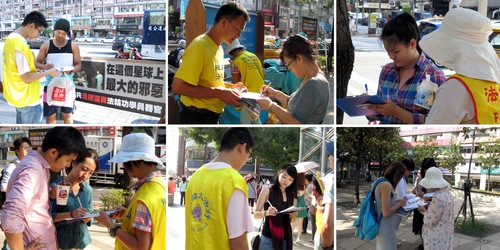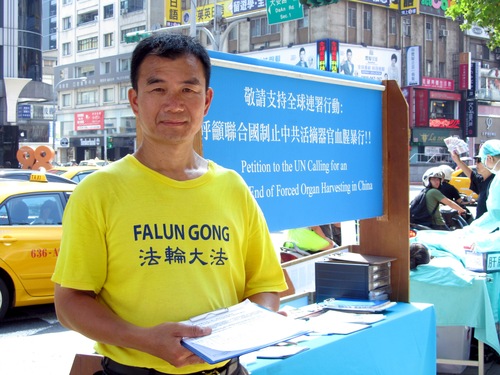(Minghui.org) The state-sanctioned crime of forced organ harvesting in China is no secret in the international community. However, many Taiwanese are still not aware of this brutal human rights violation, which is taking place so close to their shores.
To help close the information gap, Falun Gong practitioners staged an organ harvesting re-enactment, and collected signatures to protest the persecution of Falun Gong, on Dinghao Square in Taipei on September 27, 2014.
The organizer, Mr. Tsai Shouren, said, “Many Taiwanese have never heard about the illegal organ trading and forced harvesting in China. Taiwanese patients go to China for organ transplants without knowing the source of their organs.
“No one wants to be involved in this crime, but it is possible that your doctor is saving your life by killing another. So we want to let the Taiwanese know what is going on in China when it comes to organ transplants.”
The re-enactment drew a lot of attention. Many people stopped, took videos, talked to practitioners, and signed a petition to support Falun Gong's peaceful resistance.
 Many people signed the petition to condemn the brutal persecution.
Many people signed the petition to condemn the brutal persecution.
Some passersby told practitioners that they knew a little about the forced organ harvesting, but not many details, while others were shocked to learn of such a heinous crime.
Mr. Wang, 92, already knew about the persecution of Falun Gong, but he thought that it had become less severe. Ms. Tsai told him, “The Chinese Communist Party tries to hide the facts of the persecution and deceive the rest of the world.
“For example, the Party banned the labor camp system in 2013, but practitioners being held in the labor camps were transferred to brainwashing centers and prisons. The persecution has actually become even worse.”
Mr. Wang asked for more details, and encouraged practitioners to keep up the good work so that more people would know about it.
 Mr. Tsaid said, “We will continue telling people about the persecution until it ends.”
Mr. Tsaid said, “We will continue telling people about the persecution until it ends.”
Young people seemed more aware of the persecution.
When five college students passed by, one of them told his friends many details about China's forced organ harvesting from prisoners of conscience.
Surprised, a practitioner asked him, “How do you know so much about it?”
“The news is everywhere on the Internet. If I type in the key words 'organ harvesting,' I can easily find all kinds of information.”
Another student, who had just returned to Taiwan from Canada, echoed his friend, “Yes, I have seen many similar activities in Canada. It seems that everyone in Canada knows something about the forced organ harvesting. I always sign the petition to express my support.”
A young mother signed the petition and then told her 10-year-old daughter, in words she could understand, what the role-playing was all about. She said to her, “You know, I just did something very meaningful and important—I signed the petition.” The girl wanted to sign her name, too.
Ms. Dai and Ms. Liu, two schoolteachers, stopped to observe for a long time, and took many pictures and videos. They then sent the files to their friends.
“I bet some of our friends have never heard about it. It's important to let more people know about it. The more widely the information spreads, the sooner the crimes will stop, I hope,” Ms. Dai said.
Category: Organ Harvesting










